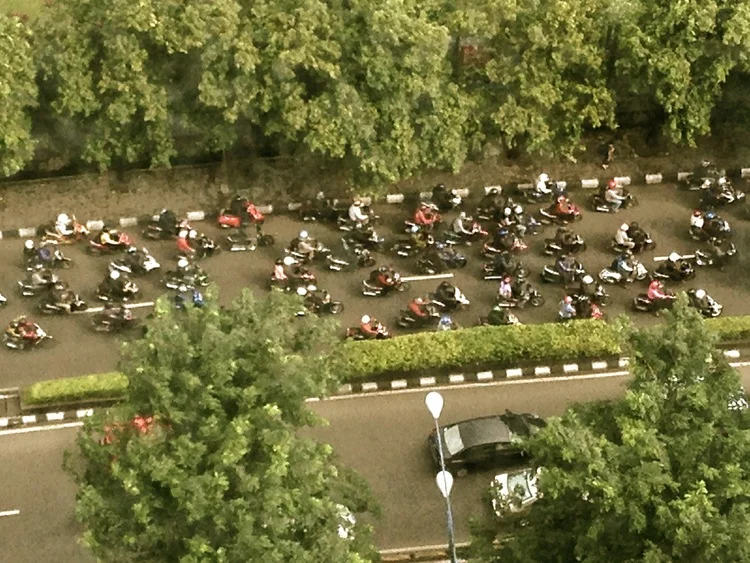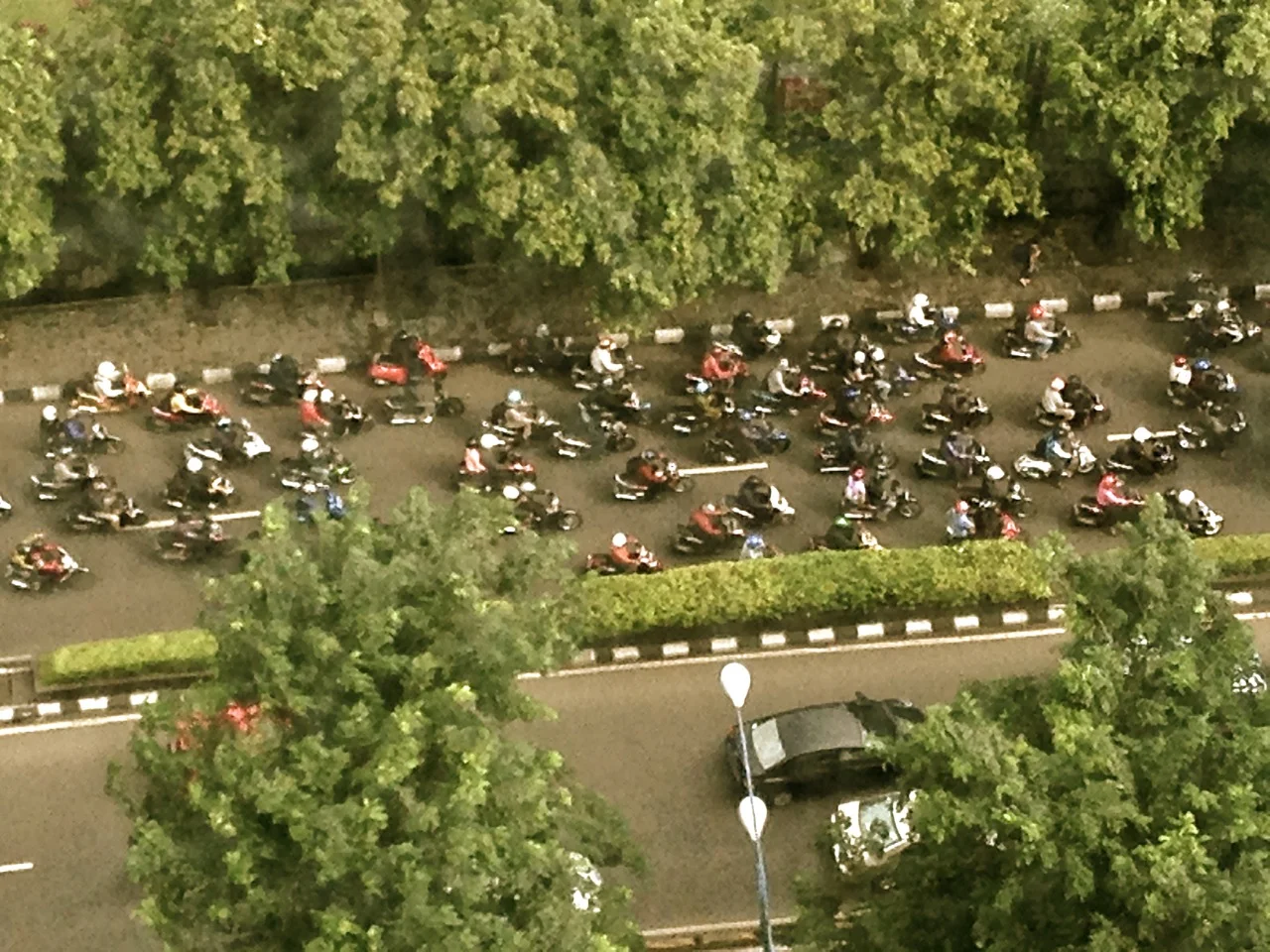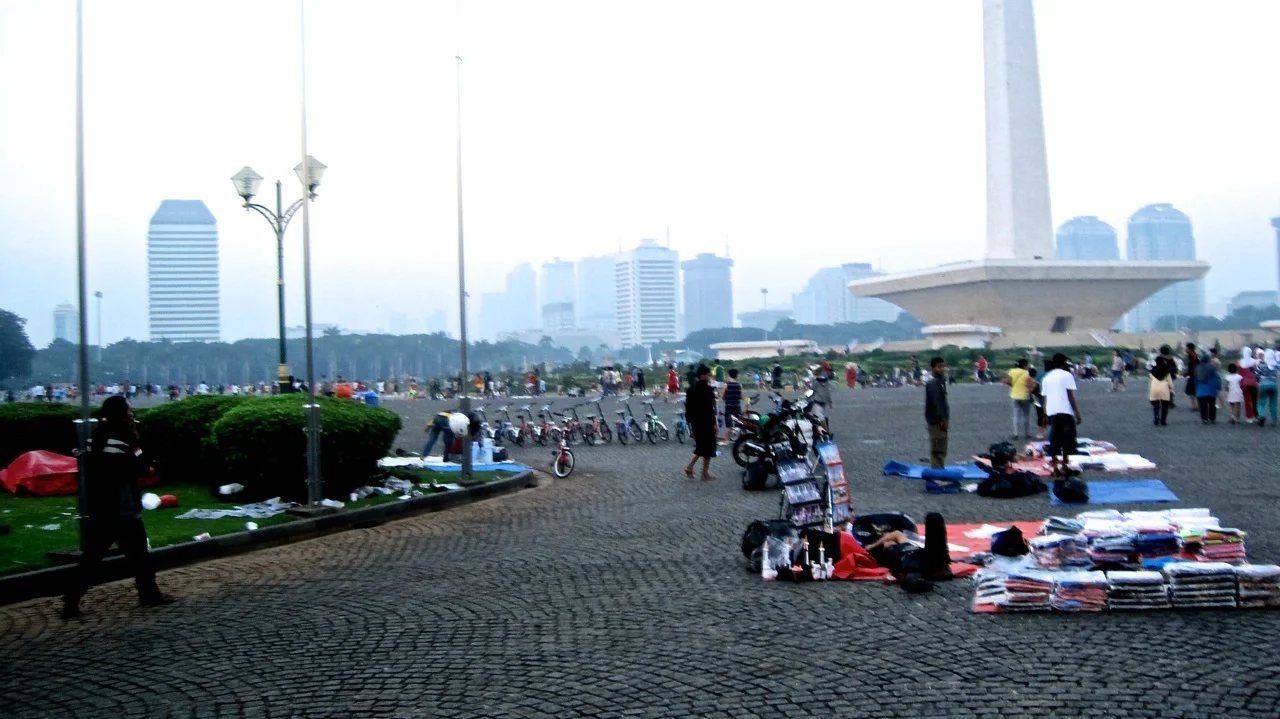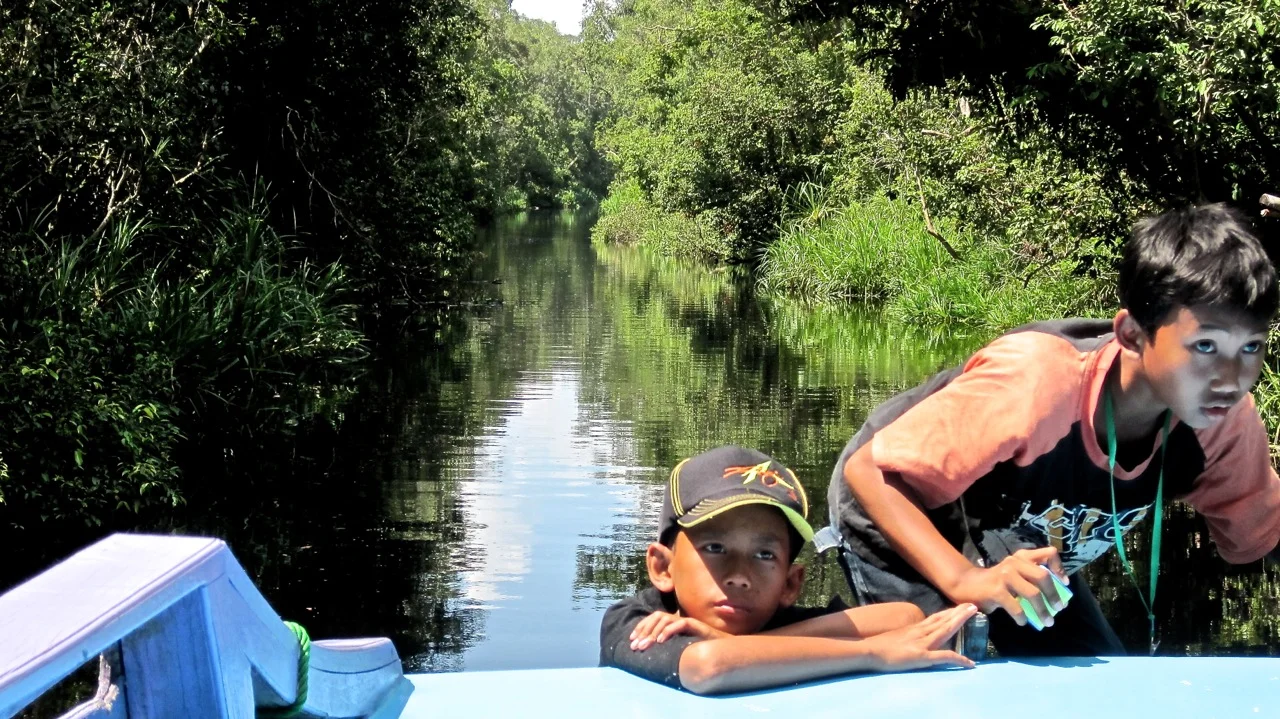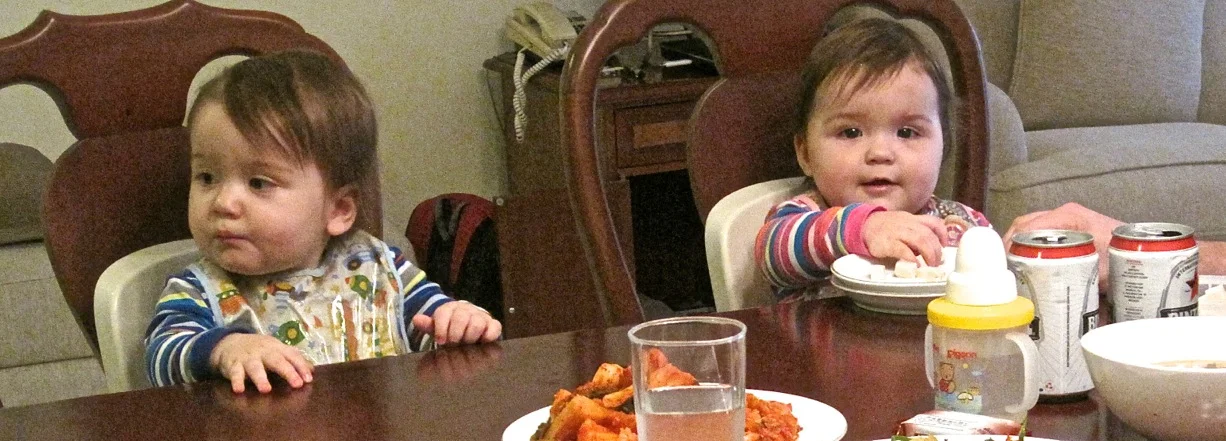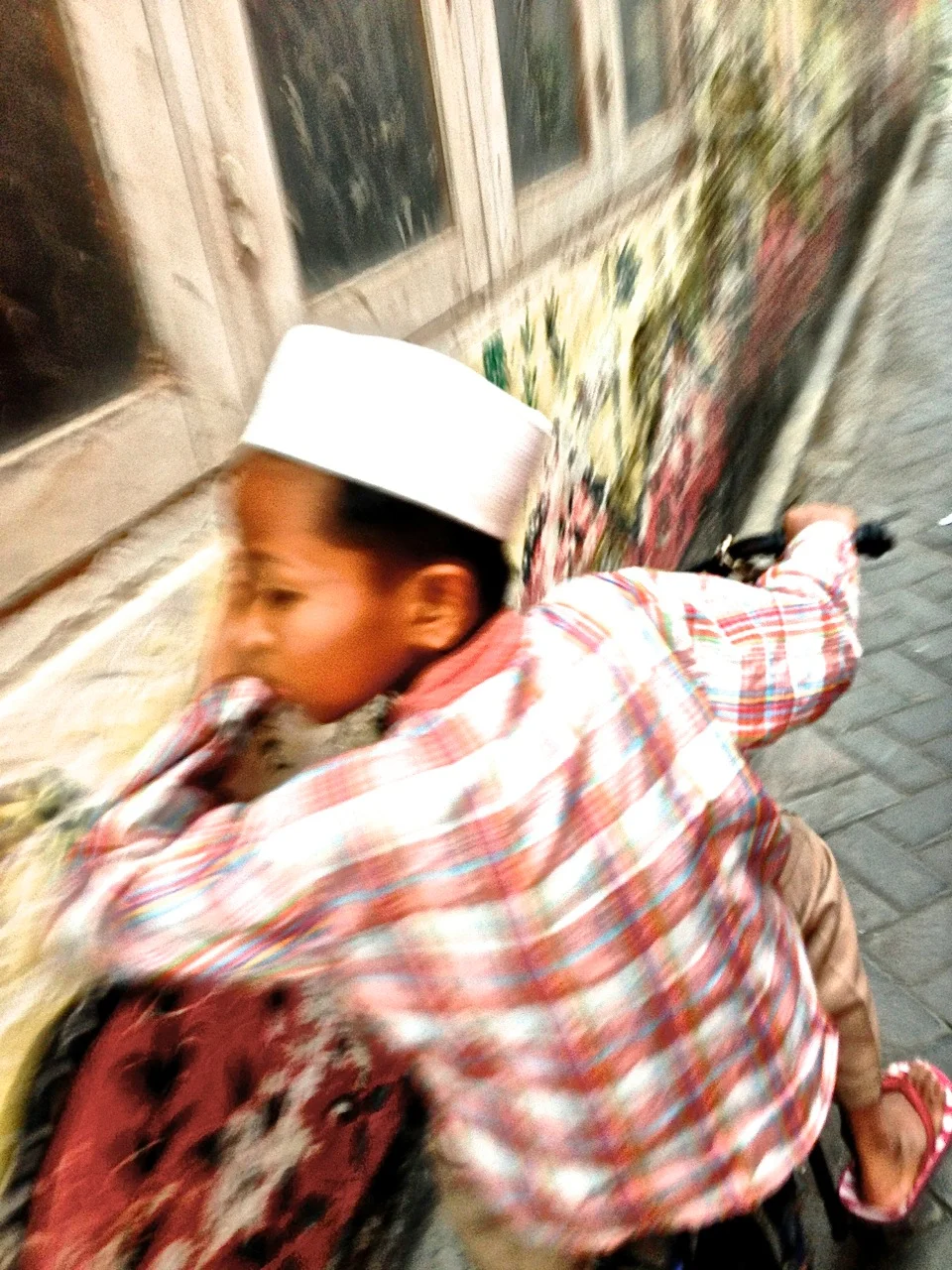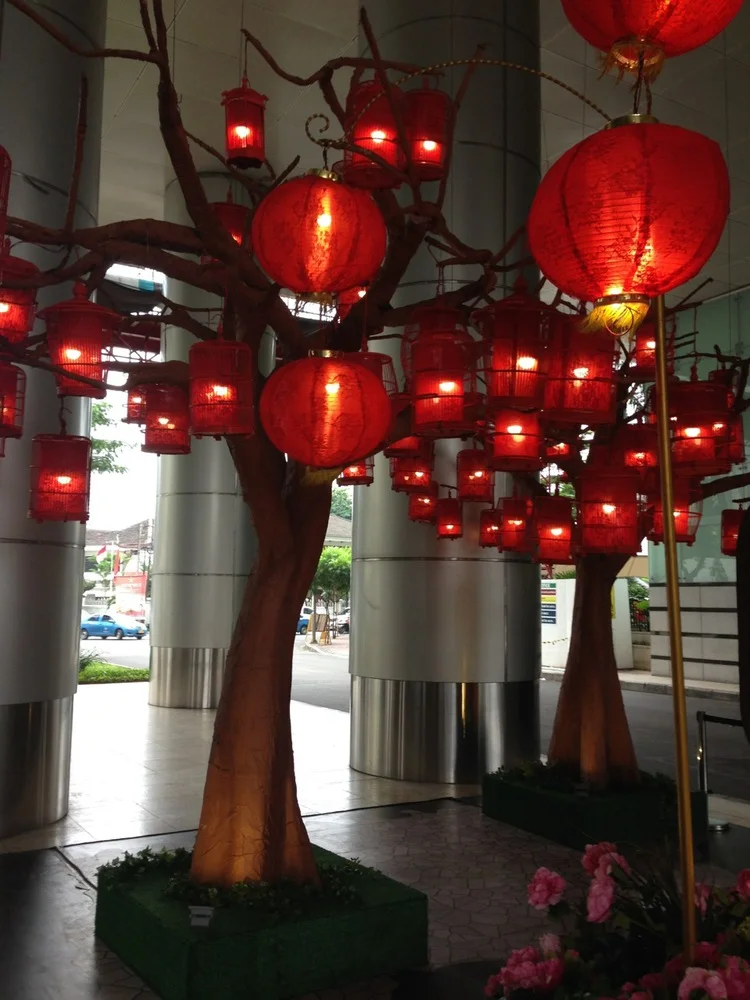Swim
Bu Rina lives with her husband Pak Lucu one-and-a-half hours by motorcycle from the house in Menteng where she works. She has had worse commutes. Indeed, three years ago she lived in Malaysia. Six years before that she lived in Saudi Arabia. One might even say Bu Rina considers herself lucky to drive one and a half hours to the Riddles, who are American, which she prefers. She is back in Indonesia with her husband, they no longer live under the nasty chicken-coop in Koto, she has a reliable job in Jakarta where even positions for Pembantu or house help is hard to come by and she absolutely loves JB and Fanny, the twins— so fat. As her husband weaves through the complex traffic patterns and gridlock of a city with 9 million people but without public transportation, she misses the one-year-old twins despite the fact that she is about to spend 10 hours with them. She clutches Pak Lucu's waist and imagines with her eyes closed that she is embracing a baby, maybe even two, of her own. The sway of the Sanyo 250cc bike is the ebb and flow of amniotic fluid. The exhaust and hum of the hundreds of vehicles is a floating, safe, pulsating mass. After four years of trying to get pregnant, Bu Rina does not experience so much a form as a feeling of waning persistent hope— the glow of burning embers. It is the winter season and the rain is coming down now. The motorcycle riders wear yellow plastic rain ponchos but drive in flip-flops with pants rolled up to the knees. Many of Jakarta’s roadways are flooded and the riders’ feet get submerged at the shins and ankles in this ritualistic migration, which at days end will take place again in the dark. Bu Rina probably spends at least half of each leg of her commute embracing Pak Lucu’s waist in this way,
Bu Rina gets paid $210 dollars a month, which is more than the Riddles have to pay her and she knows it. Most of Bu Rina’s friends get paid $150 dollars. This might include home stay, but home stay for a married Pembantu is not a benefit. It’s not like the Riddles or any other family for that matter would let Pak Lucu stay with her. So Bu Rina and Pak Lucu rent a single room across town in Depok with an extra mattress on the ground for her eldest sister, who just arrived from Yogyakarta. The cost of the room without air-conditioning is $25 dollars a month. Fuel for the bike is $10 a week. The family budgets $1.5 dollars or 15,000 Rupia for food for each person each day. They put aside $5 a week, leaving $5 dollars a month for recreation for the three. Money is tight but the money is at least consistent. The Riddles will be in Indonesia for over three years. Last week Bu Rina, Pak Lucu and her sister Eka all went to Monas to ride bikes and eat ice cream as relief from the humid hot. When Pak Lucu gets better and Bu Rina reconciles with her husband, things will be easier. But Rina knows this. She says this. Bu Rina does not lament a predicament that doesn’t allow for choices. Things could be worse.
The six rooms on each floor of the Percaya building where Bu Rina lives share a bathroom next to the fire escape. The problem with a shared bathroom at Percaya is not so much that it is dirty. The residents each take care of themselves. It is the waiting in line part. In line by 6 a.m. there is Bu Sari already wearing an ornate Hijaub and makeup. She is holding her new baby and nudges her four year-old son Rasa forward who seems able to sleep standing. Pak Milo smokes behind Bu Sari hunched on a plastic pink chair as if he were at a cafe. Bu Sandi’s 20-year-old daughter Sari comes next. Her hair is unbrushed and uncovered as many women in Jakarta are doing now-a-days. She blinks her eyes frequently as to stay awake or change the scene. Pak Hero is last and wears a grayed V-neck T-shirt and a similarly colored hand towel draped over his shoulder as he leans against the wall checking his blackberry. Bu Rina likes her neighbors fine but does not choose to engage them in this particular context. Her strategy devised long ago is to get up before everyone else at 4 a.m. then go back to sleep fully clothed ready to get up for the five thirty commute. It is the single hour between bathroom time and commute time when Bu Rina feels she gets the most rest and encounters dreams that she can actually remember. Usually these dreams involve water. Expanses, colors and opportunities of it. She is a girl playing at Lombok beach. She is a bird soaring then diving to just above the water’s surface. She hears the cadence and creak of oarlocks on a blazing white rowboat. A young couple sit with their two young children laughing as the father tries to maneuver the unwieldy oars.
When five thirty arrives, Bu Rina’s Blackberry alarm rings and up gets Bu Rina and Pak Lucu. Bu Rina might normally ride herself to work, but Pak Lucu’s current lack of employment means it is more economical for him to take Bu Rina to the House in Menteng even at the cost of gas. As they leave their room, Pak Lucu does not even bother to join the bathroom queue in the hallway, which he knows would be futile. Bu Rina suspects he will piss later in the street. Bu Rina often thinks that Pak Lucu has never given her a bad time about not getting pregnant and this is another reason that she believes Pak Lucu is a good man. Lately she worries about the lump that is growing on the front of his neck. Even the Riddles have noticed that Pak Lucu is losing weight. Pak Lucu went to the doctor spending $30 of the family emergency money but the doctor prescribed lab tests and x-rays, which they could not afford. The family has decided to save more from the recreation money and in about four months Pak Lucu can get the diagnostics that he requires so they can understand what is wrong with Pak Lucu.
Heads turn momentarily as Bu Rina and Pak Lucu emerge. While Pak Lucu locks the door with a half lit cigarette stuck to his bottom lip, Bu Rina waves Selama Pagi to Bu Sari, her sons, Pak Milo, Mbak Susan and Pak Hero in the bathroom line and there are genuine but reflexive head nods. Only momentarily, Bu Rina and Pak Lucu walk towards their neighbors only to turn at the middle of the hallway to exit the floor. They move methodically like on a long march down the three flights of stairs illuminated by the shadows of the coming day. They can hear the yodel of a rooster and the rumble of engines. The stairway smells damp.
The Riddles moved from Washington DC as part of a five year USAID funded health project currently in its second year. That is the detail the Bu Rina knows and frankly the only detail that Mrs. Riddle shares. Mrs. Riddle is an attractive matter-of-fact young professional who does not like to bring work home with her. The buzz of unanswered instant messages from her office phone, which rests on the antique table next to the ottoman, is the only consistent reminder of the professional life linked to her person. Mr. Riddle is a Frenchman who reminds Bu Rina of a magician for his flair for the dramatic and his ability to entertain. He used to be a chef but tired of impressing rich customers with the latest version of foie gross, miniature sandwiches and raspberry decorative swirls. Mr. Riddle is happy to say that he followed Mrs. Riddle to Indonesia. I loved her that much he often says with a glass of red Bordeaux 2008 in his hand. To this Mrs. Riddle rolls her eyes and says that life is relatively worse as a chef to which Mr. Riddle gestures his drink forward and says, “Wallah”
Bu Rina likes Mr. and Mrs. Riddle who are the nicest Bolehs she has ever met but she adores JB and Fanny. Sure while they nap, she sweeps and mops, dusts and does the dishes, but Mr. and Mrs. Riddle see how much Bu Rina loves JB and Fanny and also appreciate that she rarely comments on their weight. JB and Fanny are 130% percentile for weight by age. Mrs. Riddle thinks this is a consequence of her former El Salvadoran nanny in DC adding rice cereal to their formula because they were “delgalito” and needed “mas grasa” but the point is that JB and Fanny now posses arms and legs with the creases and tension of stuffed sausages. Their faces are almost perfect round and one knows they are smiling more from small wrinkles that form at the corner of their eyes than any subtle movement of their mouths. JB and Fanny at one years of age can sit by themselves but they don’t pull to a stand and they certainly don’t roll over for fear of not being able to roll back again. “Look at this leg,” Mr. Riddle says as he hold Fanny’s legs as if it were game meat. To this Fanny squeals and JB looks on curiously. Bu Rina doesn’t think of the babies weight in terms of anything but prosperity and health. “They are lucky to be as they are,” she says. Bu Rina speaks good English from her time in Saudi Arabia and Singapore. This is another benefit the Riddles has found in Bu Rina.
On this day, Mr and Mrs. Riddle are at work and Bu Rina is bathing the twins, which they like. Indonesians bathe their babies and themselves for that matter at least twice a day. The Riddles wait until the twins are dirty before bathing, which can be up to a week. This doesn’t make too much sense to Bu Rina. Babies are always dirty. Fanny and JB’s laughter and splashing is further proof to Bu Rina that they are bathing deprived. Generally Bu Rina thinks that Americans should bathe more.
“Fanny and JB suka dicunci, ya,” bu Rina clucks, “Fanny and JB like to be cleaned.” Indonesian language has preference towards the passive voice and it is implied that Bu Rina thinks that Fanny and JB especially like to be cleaned by her. This would be obvious she says singing to the babies. “Orang tua kalian tidak mau cucikan kalian begitu banyak— Your parents don’t like to clean you so much.”
Bu Rina doesn’t mean anything negative about this statement, but when Mr. and Mrs. Riddle have gone to work, it is she who becomes the parent frankly. Bu Rina was always good at Math in school before she was forced to drop out due to lack of tuition. She calculates that if she spends six days a week for ten hours with Fanny and JB and JB and Fanny sleep fifteen hours a day, who gets to be with them most of the time? The Riddles are not home before six pm. Bedtime is seven thirty. Even Rina understands the importance of foreign children having a high quality nanny. “And I speak English too!” she exclaims
JB and Fanny look up momentarily from their floating duck and train and sunken whisk and spatula at Bu Rina’s animated expression of fact. They are very happy babies and they don’t scare easily and if they knew how to distinguish the care of Mrs. Riddle from that of Bu Rina’s, they don’t show it. As Fanny looks up she continues moving her arms like the whisk next to her right leg might move. JB is still and seems to genuinely contemplate the English speaking ability of his Indonesian nanny.
“Oh JB,” Rina says, “You are so sweet.” Rina gently swipes JB’s bangs to the side where they immediately stick like the perfect part of hair in a child’s picture. This makes Rina laugh which makes JB laugh which makes Fanny at the other end of the tub a little jealous causing her to whisk her arms at a higher speed.
“Don’t worry Fanny,” Rina says, “You are beautiful Fanny! I would never forget you.” But since Rina doesn’t move from JB towards her, Fanny misunderstands the sentiment and now kick her legs. The image in truth of an overweight baby getting angry over nothing, whisking her arms and kicking her legs rather ineffectively while bathing in belly deep water is kind of funny. Rina can’t help but laugh and because she is truly enjoying the moment she watches Fanny longer than she should. Fanny doesn’t like this at all and now jerks her head back causing her to fall back knocking her head against the slant of the marble bathtub before sliding down it. Rina lets out a sudden moan and moves quickly and as Fanny’s face submerges beneath the water, she is able to quickly grab her trunk and lift her back to a sitting position.
Fanny is so startled by the chain of events that she forgets to cry. Rina is frantic but at the same time she is curious that in the moment before lifting up Fanny, she saw that Fanny’s eyes remained open under the water and she was puffing out her cheeks as if holding her breath. Fanny is currently not coughing or sputtering and in fact, is watching the floating orange boat that JB just pushed to sail. “Fanny,” Rina says, “can you swim?”
JB watches Rina as Rina rests one hand gently beneath Fanny’s back and with the other one her chest, slowly pushes Fanny backwards into the water. The movement causes Fanny to reflexively grab the hand on her chest, which squeezes at Rina’s heart—so tender. Fanny’s hands are normally very soft, but in the water they are as soft and almost ephemeral. “Just to see if you can swim,” says Rina, “just to see if you can swim.”
As Fanny’s head goes under Rina can see her face clearly. The water magnifies Fanny’s wide-open eyes and her pudgy cheeks, which indeed puff out. Rina wonders how long Fanny or a baby for that matter can stay under water. I mean a baby in the womb floats for 9 months and they need this time to develop into the beautiful babies they become. Though it pangs Rina that there is nothing floating inside her, in a way she feels Fanny is kind of floating for her on the outside--she feels her, sees her, and loves her. If Fanny was mine, Rina thinks. I could also be the best kind of mother.
It has been only 8 seconds but Fanny’s face is kind of turning red. She now is trying to push up with her arms but their nascent buoyancy prevents her from reaching the bathtub floor. Her expression is more confused than angry. She has not been in this predicament and certainly remembers nothing about the comfort of anionic fluid, which this bath water is not. As Rina looks down at Fanny’s face, Rina thinks how the world is ironic. The Riddles have twins but if they had had only JB they would not miss Fanny. Since they have JB and Fanny, is it natural that they would miss them both. But because Mrs. Riddle had two babies, does that mean somewhere else in the world, a person like Rina can have none? Rina already thinks that she has experienced first hand how one’s position in the world is literally borne of luck but she never contemplated that this would continue into her reproductive cycle. This does not seem fair to her. Not twice at least.
It is JB’s turn to be heard. What is going on at the other end of the bathtub? Where is his sister? How come she gets to play with Rina and he doesn’t? His boat left his port long ago. The whisk was always not present and the spatula is too heavy to grab. JB starts to cry. JB never cries. Rina knows JB never cries and quickly hears JB, looks to him and then back down at Fanny who’s eyes seem kind of heavy now and certainly robbed of their natural glow. The twins are not themselves. Rina feels that she is not herself when the twins are not themselves. She wants the twins back to their normal selves. With this realization, Rina lifts Fanny out of the water. Fanny is coughing now and crying and thinking that bathtub time is no longer fun. She grasps Rina around her neck and buries her head under Rina’s chin and Rina is terrified at the love she feels for this small child.
While consoling and cooing at Fanny, Rina leans down to get JB out of the water but not before stroking his bangs in the other direction which consoles JB enough for him to smile.
“That’s my handsome JB,” Rina says, “Time to get you out of the bath too. It’s time for you and Fanny to nap. Growing babies need to nap you know. Beautiful babies need to nap to grow.”

